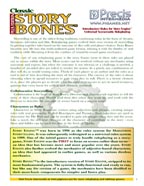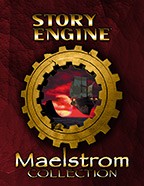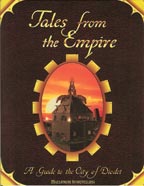UNIVERSAL RULES FOR SCENEMATIC ROLEPLAYING™
Story Engine joins the Precis Intermedia family. It was originally published by Hubris Games.
Story Engine joins the Precis Intermedia family. It was originally published by Hubris Games.
| “ONE OF THE BEST GAMES EVER” | “MY FAVORITE RPG UNIVERSAL SYSTEM” |
| “MY BRAIN WENT INTO OVERLOAD...” | “I STILL HAVEN'T STOPPED JOTTING DOWN IDEAS” |
| “FOCUS MORE ON THE NARRATIVE THAN ON THE RULES” | “THE GRAND DADDY OF ALL NARRATIVE GAMES” |
| “PLAY MUCH FASTER THAN THE USUAL RPG” | “I CAN PLAY ANY RPG SETTING” |
Story Engine came into existence in 1996 as the rules system for Maelstrom Storytelling. It was redesigned for universal play in 1999. One of the first games to truly handle roleplaying as a story game, it was the first set of rules that was "scene-based" -- an idea that has become more and more popular as story games escape the confines of "round-based" rules. Story Engine also further evolved the mechanics of "adjective-based" characters.
Storytelling is one of the oldest living traditions, continuing today in the form of theatre, literature, television and film. Roleplaying games evolved their own version of storytelling by piecing together a tale based on the outcome of dice rolls and player choices in the form of a game. Story Engine breathes new life into this multi-authored game format, infusing it with the fluidity of oral tradition while liberating it from the confines of round-by-round game mechanics.
Collaboration is the heart of Story Engine; narrators and players work together to tell the story of their characters. Players pool their dice when they team up, and work with the narrator to describe the outcome of scenes based on a success range. In Story Engine, action is resolved as scenes. Each scene advances the story, framed by the goals of the characters without pre-set lengths or segmented rounds. Players can spend resources and bid with opponents to increase their die pool, and even insert sub-scenes in the form of Quick Takes. Since scenes are resolved as a whole with one large roll of the dice, action moves quickly to ensure a fluid story and fast pace.
Characters in Story Engine are written using adjectives and phrases, creating unique roles with real personality. Called Descriptors and Traits, these adjectives are used to determine the die pool and can be invoked to gain advantages when they suit the scene. Like a novel the different elements of the character all contribute to the story -- even flaws and foibles can be used this way in the form of Quirks.
Also be sure to check out StoryMax, the next generation of the Story Engine rules.
Storytelling is one of the oldest living traditions, continuing today in the form of theatre, literature, television and film. Roleplaying games evolved their own version of storytelling by piecing together a tale based on the outcome of dice rolls and player choices in the form of a game. Story Engine breathes new life into this multi-authored game format, infusing it with the fluidity of oral tradition while liberating it from the confines of round-by-round game mechanics.
Collaboration is the heart of Story Engine; narrators and players work together to tell the story of their characters. Players pool their dice when they team up, and work with the narrator to describe the outcome of scenes based on a success range. In Story Engine, action is resolved as scenes. Each scene advances the story, framed by the goals of the characters without pre-set lengths or segmented rounds. Players can spend resources and bid with opponents to increase their die pool, and even insert sub-scenes in the form of Quick Takes. Since scenes are resolved as a whole with one large roll of the dice, action moves quickly to ensure a fluid story and fast pace.
Characters in Story Engine are written using adjectives and phrases, creating unique roles with real personality. Called Descriptors and Traits, these adjectives are used to determine the die pool and can be invoked to gain advantages when they suit the scene. Like a novel the different elements of the character all contribute to the story -- even flaws and foibles can be used this way in the form of Quirks.
Also be sure to check out StoryMax, the next generation of the Story Engine rules.

Previews























